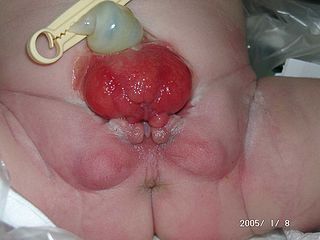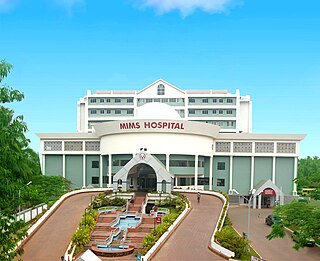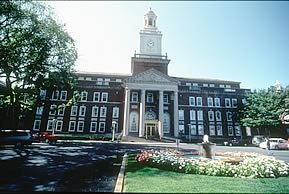
Pediatrics is the branch of medicine that involves the medical care of infants, children, adolescents, and young adults. In the United Kingdom, paediatrics covers many of their youth until the age of 18. The American Academy of Pediatrics recommends people seek pediatric care through the age of 21, but some pediatric subspecialists continue to care for adults up to 25. Worldwide age limits of pediatrics have been trending upward year after year. A medical doctor who specializes in this area is known as a pediatrician, or paediatrician. The word pediatrics and its cognates mean "healer of children", derived from the two Greek words: παῖς and ἰατρός. Pediatricians work in clinics, research centers, universities, general hospitals and children's hospitals, including those who practice pediatric subspecialties.

Urology, also known as genitourinary surgery, is the branch of medicine that focuses on surgical and medical diseases of the urinary system and the reproductive organs. Organs under the domain of urology include the kidneys, adrenal glands, ureters, urinary bladder, urethra, and the male reproductive organs.

Deepak Chopra is an Indian-American author, new age guru, and alternative medicine advocate. A prominent figure in the New Age movement, his books and videos have made him one of the best-known and wealthiest figures in alternative medicine. In the 1990s, Chopra, a physician by education, became a popular proponent of holistic approach to well-being that includes yoga, meditation, and nutrition, among other new-age therapies.

Hypospadias is a common malformation in fetal development of the penis in which the urethra does not open from its usual location on the head of the penis. It is the second-most common birth defect of the male reproductive system, affecting about one of every 250 males at birth, although when including milder cases, is found in up to 4% of newborn males. Roughly 90% of cases are the less serious distal hypospadias, in which the urethral opening is on or near the head of the penis (glans). The remainder have proximal hypospadias, in which the meatus is all the way back on the shaft of the penis, near or within the scrotum. Shiny tissue or anything that typically forms the urethra instead extends from the meatus to the tip of the glans; this tissue is called the urethral plate.
Pediatric urology is a surgical subspecialty of medicine dealing with the disorders of children's genitourinary systems. Pediatric urologists provide care for both boys and girls ranging from birth to early adult age. The most common problems are those involving disorders of urination, reproductive organs and testes.

The Children's Hospital of Philadelphia, also known by its acronym CHOP, is a children's hospital in Philadelphia, Pennsylvania. Its primary campus is located in the University City neighborhood of West Philadelphia on the campus of the University of Pennsylvania. The hospital has 594 beds and more than one million outpatient and inpatient visits annually. It is one of the world's largest and oldest children's hospitals and the first hospital in the United States dedicated to the healthcare of children.

Bladder exstrophy is a congenital anomaly that exists along the spectrum of the exstrophy-epispadias complex, and most notably involves protrusion of the urinary bladder through a defect in the abdominal wall. Its presentation is variable, often including abnormalities of the bony pelvis, pelvic floor, and genitalia. The underlying embryologic mechanism leading to bladder exstrophy is unknown, though it is thought to be in part due to failed reinforcement of the cloacal membrane by underlying mesoderm. Exstrophy means the inversion of a hollow organ.

The Hindu American Foundation is an American Hindu non-profit advocacy group founded in 2003. The organisation has its roots in the Hindu nationalist organisation Vishwa Hindu Parishad America and its student wing Hindu Students Council.

Bangalore Medical College and Research Institute (BMCRI), formerly Bangalore Medical College (BMC), is a medical college run by the Government of Karnataka. It is located on K.R. Road, near City Market. It is a government medical college in Bangalore and one of 10 in Karnataka. BMCRI is an autonomous institution under the Rajiv Gandhi University of Health Sciences, Jayanagar, Bangalore.
Beaumont Health was Southeast Michigan’s largest health care system and was headquartered in Southfield, Michigan. It merged with Spectrum Health of West Michigan in 2023 to form Corewell Health, with the headquarters of the new health system being located in Grand Rapids. At the time of its merger, the health system had a net revenue of $4.7 billion and consisted of eight hospitals with 3,375 beds, 155 outpatient sites, nearly 5,000 physicians, more than 33,000 employees and about 2,000 volunteers. The flagship hospital of the system was the Beaumont Hospital, Royal Oak, located in the Detroit suburb of Royal Oak, Michigan.

Nationwide Children's Hospital is a nationally ranked pediatric acute care teaching hospital located in the Southern Orchards neighborhood of Columbus, Ohio. The hospital has 673 pediatric beds and is affiliated with the Ohio State University College of Medicine. The hospital provides comprehensive pediatric specialties and subspecialties to infants, children, teens, and young adults aged 0–21 throughout Ohio and surrounding regions. Nationwide Children's Hospital also sometimes treats adults that require pediatric care. Nationwide Children's Hospital also features an ACS-verified Level 1 Pediatric Trauma Center, one of four in the state. The hospital has affiliations with the nearby Ohio State University Wexner Medical Center. Nationwide Children's Hospital is located on its own campus and has more than 1,379 medical staff members and over 11,909 total employees.

Rajiv Malhotra is an Indian-born American Hindu nationalist ideologue, author and the founder of Infinity Foundation, which focuses on Indic studies, and also funds projects such as Columbia University's project to translate the Tibetan Buddhist Tengyur.

Lancaster General Health is a regional hospital located in Lancaster, Pennsylvania. It is part of the University of Pennsylvania Health System. Its flagship hospital is Lancaster General Hospital. Founded in 1893 in a small home on Queen Street, the hospital is now an approximately 590-bed facility located at 555 N. Duke Street in Lancaster City. The health system encompasses the main acute-care hospital, Lancaster General Hospital, in addition to a specialty hospital for women, Woman & Babies Hospital, as well as joint venture in-patient facilities Lancaster Rehabilitation Hospital and Lancaster Behavioral Health Hospital.

Aster MIMS is an NABH accredited 950-bed super-specialty hospital located in Kozhikode, India. It is located on Mini Bypass Road, Opp Kovilakam Residency Govindapuram, Kozhikode, Kerala, India. Aster MIMS, an NABH-accredited hospital, was established to offer advanced medical treatment of international standards at affordable rates. MIMS has also established a 200-bed hospital at Changuvetty, Kottakkal, and in Chala, Kannur.

Indraprastha Apollo Hospital is an Indian hospital owned by Apollo Hospitals group, India's largest healthcare chain. Established in 1995, it is the third super specialty tertiary care hospital set by the Apollo Hospitals Group, jointly with the Government of Delhi. It is a 695-bed hospital, with the provision for expansion to 1000 beds in future. The hospital is spread over 15 acres, and has a built-up area of 600,000 square feet.

Invading the Sacred: An Analysis of Hinduism Studies in America is a book published in 2007 by Rupa & Co. which argues that there are factual inaccuracies in Hindu studies. The editors of the book are Krishnan Ramaswamy, Antonio T. de Nicolás, and Aditi Banerjee. The book has contributions from Arvind Sharma of McGill University, S. N. Balagangadhara of Ghent University, psychoanalyst Alan Roland, Yvette Rosser, Ramesh N. Rao, Pandita Indrani Rampersad, Yuvraj Krishnan, and others. Rajiv Malhotra played a large role in drafting most of the book's content. He stated that through this book, he intended to bring attention to, and provide a counter-argument to, the prevalent Freudian psychoanalytical critiques of Hinduism in the American Academy of Religion's RISA group. After the controversy surrounding Wendy Doniger's book The Hindus: An Alternative History erupted in India, the authors decided to make it freely available online as it critiques a major part of her work.
The University of Tennessee College of Medicine is one of six graduate schools of the University of Tennessee Health Science Center (UTHSC) in downtown Memphis. The oldest public medical school in Tennessee, the UT College of Medicine is a LCME-accredited member of the Association of American Medical Colleges (AAMC) and awards graduates of the four-year program Doctor of Medicine (MD) degrees. The college's primary focus is to provide practicing health professionals for the state of Tennessee.

Reading Hospital is a 697-bed non-profit teaching hospital located in West Reading, Pennsylvania. The hospital was established in 1867 and is the anchor institution of Tower Health.
Ara Babloyan is an Armenian doctor pediatrician and politician, and the former President of the National Assembly of Armenia.

Jay Y. Gillenwater is professor emeritus at the University of Virginia. He is former chair of the Department of Urology at the School of Medicine of the University of Virginia, was president of the American Urological Association, editor of the Journal of Urology, member of the NIH Advisory Council of Diabetes, Digestive, and Kidney Diseases, and president of the American Foundation for Urologic Diseases. He is the author of Adult and Pediatric Urology.
















